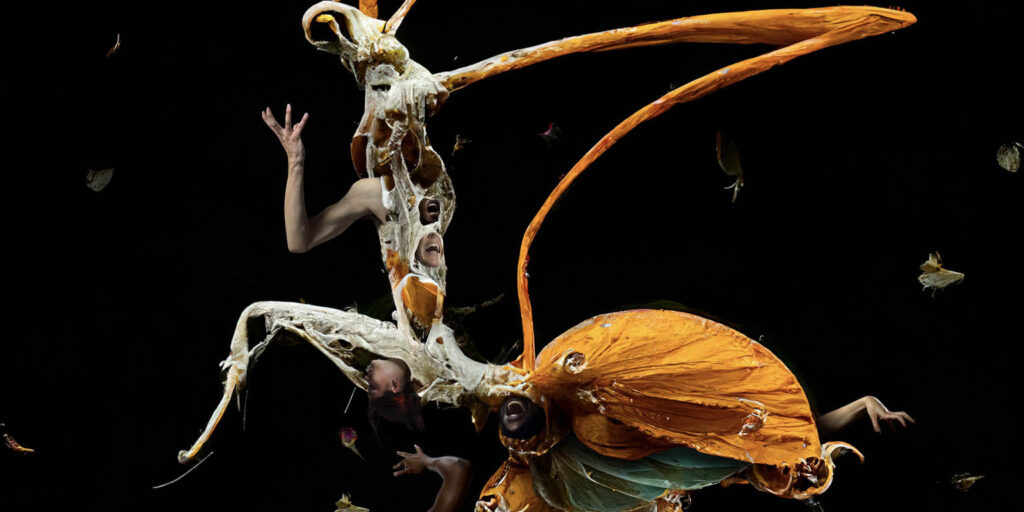
Metamorphosis
Connaught Theatre, Worthing
The novella ‘Metamorphosis’ by Franz Kafka, adapted by Lemn Sissay
Performed by Frantic Assembly in association with CURVE and the Lyric, Hammersmith
Directors: Scott Graham and David Gilbert
Tuesday 3 October – Saturday 7 October 2023
You know that when you arrive at the theatre and wend your way slowly through hundreds of students in the foyer, that the subject of this particular production is on the current school curriculum. And so it was at the Connaught Theatre, Worthing on the opening night, meaning that possibly my companion and I were amongst the few people over the age of 18. This took me back to my own ‘A’ levels when we studied Kafka’s original German text. This adaptation, though, by the luminary poet Lemn Sissay, promised to be a very different experience from the high angst – we’ll come to that word again – I felt at the age of 17, dissecting this emotionally charged novella written in middle high German. Kafka, during his short lifetime, produced innumerable writings and short stories, of which only a handful were published, his own wish. ‘Metamorphosis’ (published in 1915) is arguably the most well-known and discussed; a wealth of critical essays and books have been written around Kafka and his book, including one by our very own David Baddiel ‘The Entomology of Gregor Samsa’. Gregor being the central character of the book, a travelling salesman who woke up one morning to find himself transformed into a gigantic hideous insect.
As a real admirer of Frantic Assembly’s incredibly creative work, giving real meaning to the term ‘performing art’, I knew I’d be in for something extraordinary – and I was not wrong. When the play opened, we found ourselves looking into a grey, distorted cell-like room, with Grete (Gregor’s sister played by Hannah Sinclair), playfully trying out Gregor’s fabrics (he is a cloth merchant) and posing in front of the dressing mirror. She spends quite a time on stage before we catch our first glimpse of the hapless Gregor (a perfectly brilliant performance from Felipe Pacheco). Repitition plays an important part in the play, and it starts here, with Gregor pacing back and forth across the stage, demonstrating the relentless regularity of his daily routine: wakes at the same time each morning, takes the same train, to the same unfulfilling job, just to pay off the family debt, a burden offloaded onto Gregor by his bankrupt and uncommunicative father, and a mother equally unsympathetic to the futility of the existence they have inflicted upon their son’s life. His sister Grete is the only one who is kind to him.
The first act catapulted us into the shocking, forever altered world in which Gregor found himself – as ‘disgusting vermin’ (although Kafka never made it clear what manner of insect he became, he is usually depicted as a cockroach). There followed Grete’s initial acts of kindness – bringing Gregor food, and visiting him whilst he was locked in his room – whilst his parents found him both disgusting and appalling, and even worse, a burden they wanted none of. No longer the breadwinner, they became cruel and hostile. As eventually did his sister Grete.
Felipe Pacheco’s performance was outstanding, the pure physicality of his movements involved gravity-defying gymnastic feats which were truly jaw dropping. Swinging from the ceiling, hanging from picture rails and pendant lights, whilst delivering a hefty amount of dialogue was nothing short of eye-popping. Plus his interpretation of a creature’s twitching, convulsive movements rendered the need for costume entirely redundant.
The second act opened with long soliloquies from Mr and Mrs Samsa (Troy Glasgow and Louise Mai Newberry), and some odd, out of sequence pieces, to include the lodger (Joe Layton) with dialogue I didn’t recognise, and found slightly difficult to relate to. However, as Lemn Sissay is a highly respected, immensely talented poet of our times, and not known as a dramatist, perhaps this is why the play comes across as rather more lyrical than simply a ‘straight’ drama. ‘Metamorphosis’ has always been seen as allegorical too, mirroring, in many respects, Kafka’s own life and his relationship with his parents. In this play, the parents cruel rejection of Gregor is quite visceral, and overwhelmingly stems from the fact that he is no longer bringing in the money. Sissay’s metaphorical language and use of repetitive phrases (Mr Samsa: ‘Beggars can’t be choosers’) is incredibly useful in assisting interpretation of how Gregor’s life plays out, and marks the correlation between his plight and the human condition, where all lives can be affected by systems – the constant struggle to come to terms with them – and his eventual death, locked in his room and condemned to starvation.
For me, the first act was immensely satisfying, and I was eager for the second act to commence. However, I felt that the play plateaued out somewhat and what followed was rather convoluted, nothing really affecting me as much as those initial horrifying scenes.
I should say here, however, that each of the five members of this production from Frantic Assembly were just as amazing as I expected them to be, all delivering incredibly powerful performances. The clever lighting (Simisola Majekodunmi) immediately launching us into a world of unease and disharmony, together with the atmospheric rippling piano and soft orchestral background sounds (Stefan Janik and Helen Skiera), were both sinister and foreboding. However, as far as I am concerned, the most compelling reason for witnessing this masterpiece of theatre is the sheer quality of Frantic Assembly’s performance technique: the ability to deliver a complex story through the amalgam of dialogue, movement and dance. In my opinion, unmatched.
Yes, I felt the angst once more, but this time, having spent a good more time in the world, I understood exactly why.
⭐⭐⭐⭐
2 hours 20 minutes, including interval
Touring from 7 October
Reviewer: Gill Ranson